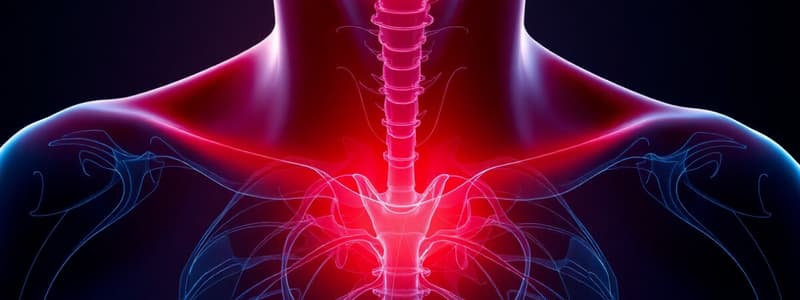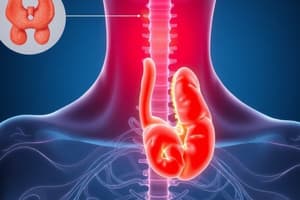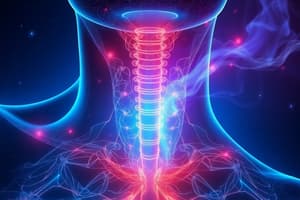Podcast
Questions and Answers
What is a common physical characteristic of Cushing's Syndrome?
What is a common physical characteristic of Cushing's Syndrome?
- Muscle hypertrophy
- Weight loss
- Truncal obesity (correct)
- Hyperthyroidism
What should be monitored for a patient who is receiving IV Ca gluconate for calcium levels below 6.9?
What should be monitored for a patient who is receiving IV Ca gluconate for calcium levels below 6.9?
- Vital signs only
- Patient's blood glucose levels (FSBS)
- Patient must be on a monitor (correct)
- Electrolyte levels only
What is often a psychological impact of physical changes in Cushing's Syndrome?
What is often a psychological impact of physical changes in Cushing's Syndrome?
- Increased anxiety and depression (correct)
- Total emotional stability
- Improved social interactions
- Enhanced self-esteem
Which dietary modification is typically recommended for patients with Cushing's Syndrome?
Which dietary modification is typically recommended for patients with Cushing's Syndrome?
What is a potential effect of prolonged corticosteroid use?
What is a potential effect of prolonged corticosteroid use?
What is a clinical manifestation associated with hyperglycemia in Cushing's Syndrome?
What is a clinical manifestation associated with hyperglycemia in Cushing's Syndrome?
Why is monitoring for edema important in patients with Cushing's Syndrome?
Why is monitoring for edema important in patients with Cushing's Syndrome?
What is a non-physical change that healthcare providers should monitor in a patient with Cushing's Syndrome?
What is a non-physical change that healthcare providers should monitor in a patient with Cushing's Syndrome?
What is one of the main causes of hyperparathyroidism?
What is one of the main causes of hyperparathyroidism?
What symptom should be monitored in a patient with hyperparathyroidism?
What symptom should be monitored in a patient with hyperparathyroidism?
What is a common treatment for hyperthyroidism?
What is a common treatment for hyperthyroidism?
Which electrolyte imbalance is indicative of hyperparathyroidism?
Which electrolyte imbalance is indicative of hyperparathyroidism?
Which condition is a potential result of inadequate secretion of parathyroid hormone (PTH)?
Which condition is a potential result of inadequate secretion of parathyroid hormone (PTH)?
Which of the following is a symptom associated with hypothyroidism?
Which of the following is a symptom associated with hypothyroidism?
What underlying condition can lead to hyperthyroidism?
What underlying condition can lead to hyperthyroidism?
What is a common sign of hypoparathyroidism?
What is a common sign of hypoparathyroidism?
What might prolonged QT interval on an EKG indicate in a patient with hypoparathyroidism?
What might prolonged QT interval on an EKG indicate in a patient with hypoparathyroidism?
What dietary adjustment is recommended for a patient with hyperthyroidism?
What dietary adjustment is recommended for a patient with hyperthyroidism?
Which symptom is indicative of hypothyroidism?
Which symptom is indicative of hypothyroidism?
What condition can result from the removal of the parathyroid gland?
What condition can result from the removal of the parathyroid gland?
Which medication is commonly prescribed for hypothyroidism?
Which medication is commonly prescribed for hypothyroidism?
Which of the following is NOT a symptom associated with hypoparathyroidism?
Which of the following is NOT a symptom associated with hypoparathyroidism?
What is one of the recommended treatments for managing hypoparathyroidism?
What is one of the recommended treatments for managing hypoparathyroidism?
Which of these is a serious risk associated with untreated hypothyroidism?
Which of these is a serious risk associated with untreated hypothyroidism?
In patients with hyperparathyroidism, what should be monitored for potential neurological complications?
In patients with hyperparathyroidism, what should be monitored for potential neurological complications?
What lifestyle modification is important for managing hyperthyroidism?
What lifestyle modification is important for managing hyperthyroidism?
What can result from excessive production of thyroid hormone in hyperthyroidism?
What can result from excessive production of thyroid hormone in hyperthyroidism?
Which complication should be monitored in patients receiving treatment for hyperthyroidism?
Which complication should be monitored in patients receiving treatment for hyperthyroidism?
What is a common cause of adrenal insufficiency in Addison's disease?
What is a common cause of adrenal insufficiency in Addison's disease?
Which of the following electrolyte imbalances is typically associated with Addison's disease?
Which of the following electrolyte imbalances is typically associated with Addison's disease?
What symptom is commonly observed in patients with Addison's disease due to hormonal imbalance?
What symptom is commonly observed in patients with Addison's disease due to hormonal imbalance?
What dietary recommendation is typically given to patients with Addison's disease?
What dietary recommendation is typically given to patients with Addison's disease?
Which physical change can indicate hyperpigmentation in Addison's disease?
Which physical change can indicate hyperpigmentation in Addison's disease?
What should be monitored in patients with Addison's disease to watch for complications?
What should be monitored in patients with Addison's disease to watch for complications?
Which of the following is a critical reaction to educate patients and their families about regarding Addison's disease?
Which of the following is a critical reaction to educate patients and their families about regarding Addison's disease?
What form of therapy is essential for managing Addison's disease?
What form of therapy is essential for managing Addison's disease?
What is a notable effect of hypercortisolism associated with Cushing's Syndrome?
What is a notable effect of hypercortisolism associated with Cushing's Syndrome?
Which condition is likely to develop due to prolonged corticosteroid use?
Which condition is likely to develop due to prolonged corticosteroid use?
What is essential when administering IV calcium gluconate for calcium levels below 6.9?
What is essential when administering IV calcium gluconate for calcium levels below 6.9?
What is a common dietary recommendation for individuals with Cushing's Syndrome?
What is a common dietary recommendation for individuals with Cushing's Syndrome?
What physical characteristic is frequently associated with Cushing's Syndrome?
What physical characteristic is frequently associated with Cushing's Syndrome?
How does hyperglycemia manifest in patients with Cushing's Syndrome?
How does hyperglycemia manifest in patients with Cushing's Syndrome?
What must healthcare providers monitor for patients with Cushing's Syndrome to prevent complications?
What must healthcare providers monitor for patients with Cushing's Syndrome to prevent complications?
Which factor may contribute to fatigue in patients with Cushing's Syndrome?
Which factor may contribute to fatigue in patients with Cushing's Syndrome?
What is a common cause of hypoparathyroidism?
What is a common cause of hypoparathyroidism?
What is a typical symptom of hyperparathyroidism?
What is a typical symptom of hyperparathyroidism?
Which electrolyte imbalance is associated with hypoparathyroidism?
Which electrolyte imbalance is associated with hypoparathyroidism?
What should be monitored in a patient with hypoparathyroidism for potential complications?
What should be monitored in a patient with hypoparathyroidism for potential complications?
What is a primary treatment strategy for managing osteoporosis in patients with hyperparathyroidism?
What is a primary treatment strategy for managing osteoporosis in patients with hyperparathyroidism?
What is a potential neurological symptom to monitor for in patients with hypoparathyroidism?
What is a potential neurological symptom to monitor for in patients with hypoparathyroidism?
What condition may result from hypersecretion of parathyroid hormone (PTH)?
What condition may result from hypersecretion of parathyroid hormone (PTH)?
What lifestyle change is recommended to help manage symptoms of hypoparathyroidism?
What lifestyle change is recommended to help manage symptoms of hypoparathyroidism?
Which symptom might indicate chronic complications in a patient with hyperparathyroidism?
Which symptom might indicate chronic complications in a patient with hyperparathyroidism?
What monitoring practice is essential for patients with hyperparathyroidism?
What monitoring practice is essential for patients with hyperparathyroidism?
Which symptom is most directly associated with hyperthyroidism?
Which symptom is most directly associated with hyperthyroidism?
What is a common treatment option for hypothyroidism?
What is a common treatment option for hypothyroidism?
Which of the following manifestations is typical for hyperthyroidism?
Which of the following manifestations is typical for hyperthyroidism?
What dietary consideration is important for a patient with hypothyroidism?
What dietary consideration is important for a patient with hypothyroidism?
Which condition is a potential cause of hyperthyroidism?
Which condition is a potential cause of hyperthyroidism?
What is a significant risk to monitor for patients receiving treatment for hyperthyroidism?
What is a significant risk to monitor for patients receiving treatment for hyperthyroidism?
What is a manifestation of hypothyroidism?
What is a manifestation of hypothyroidism?
Which treatment method is NOT used for managing hyperthyroidism?
Which treatment method is NOT used for managing hyperthyroidism?
Which symptom indicates hypothyroidism?
Which symptom indicates hypothyroidism?
What complication is unlikely to occur in patients with untreated hypothyroidism?
What complication is unlikely to occur in patients with untreated hypothyroidism?
What is a primary cause of adrenal insufficiency in Addison's disease?
What is a primary cause of adrenal insufficiency in Addison's disease?
Which of the following electrolytes is typically decreased in Addison's disease?
Which of the following electrolytes is typically decreased in Addison's disease?
What is a hallmark physical sign of Addison's disease?
What is a hallmark physical sign of Addison's disease?
What symptom may indicate hypoglycemia in a patient with Addison's disease?
What symptom may indicate hypoglycemia in a patient with Addison's disease?
What psychological symptoms may be observed in patients with Addison's disease?
What psychological symptoms may be observed in patients with Addison's disease?
Which dietary recommendation is essential for patients with Addison's disease?
Which dietary recommendation is essential for patients with Addison's disease?
What is a critical aspect of patient education for those with Addison's disease?
What is a critical aspect of patient education for those with Addison's disease?
What condition may result from inadequate production of adrenal hormones in Addison's disease?
What condition may result from inadequate production of adrenal hormones in Addison's disease?
Flashcards are hidden until you start studying
Study Notes
Hyperthyroidism
- Excess production and circulation of thyroid hormone (TH)
- Causes: overfunctioning of the thyroid (Graves’ Disease), thyroid cancer, thyroid hormone replacement
- Manifestations: Goiter, hypertension, increased cardiac output, hypertrophy, increased appetite, weight loss, hair loss, thin and brittle nails, mood swings, insomnia
- Treatments:
- High calorie diet with frequent snacks (increased carbohydrates and protein)
- Increased fluid intake (oral and IV)
- Antithyroid drugs
- Beta Blockers
- Radioactive Iodine Therapy
- Nursing Considerations: Monitor for signs and symptoms of thyroid storm
Hypothyroidism
- Deficiency of TH
- Causes: autoimmune (Hashimoto's), decreased thyroid function, anterior pituitary problems, removal of thyroid gland
- Manifestations: Decreased cardiac output, shortness of breath, exercise intolerance, constipation, weight gain, cold intolerance, fatigue, weakness, depression
- Treatments:
- Low calorie, high protein and fiber diet
- Levothyroxine (Synthroid) - monitor for angina and dysrhythmias
- Nursing Considerations: Teach about lifelong HRT, required labs, monitor for signs and symptoms of myxedema coma and thyroid storm
Hyperparathyroidism
- Excess of Parathyroid Hormone (PTH)
- Causes: benign neoplasm of the parathyroid gland(s), renal failure
- Manifestations: Nausea/vomiting, constipation, osteoporosis, pathologic fractures, depression, psychosis, increased urine calcium, kidney stones, hypertension, cardiac dysrhythmias, increased serum calcium and decreased serum phosphorus
- Treatments:
- Surgery
- Nursing Considerations: Watch for tetany, monitor neurologic status, teach pt about risk factors for fractures, biphosphonates, exercise to build bone, stool softeners, increased PO fluids
Hypoparathyroidism
- Inadequate secretion of PTH or failure of target cells to respond to PTH
- Causes: damage to or removal of thyroid or parathyroid gland, radiation to the neck area
- Manifestations: Abdominal and muscle cramps, numbness, tingling, cramps, fatigue, weakness, depression, seizures, dysrhythmias, hyperactive DTRs, decreased serum calcium and increased serum phosphorus
- Treatments:
- Oral calcium and Vitamin D supplements
- IV calcium gluconate for calcium less than 6.9 - Pt must be on a monitor!
- Nursing Considerations: Watch for tetany (Chvostek's and Trousseau's signs), monitor neurologic status and seizures, monitor EKG for prolonged QT and ST interval, monitor respiratory status
Hypercortisolism (Cushing’s Syndrome)
- Excess of glucocorticoids
- Causes: prolonged corticosteroid use, ACTH-secreting pituitary tumor, adrenal neoplasm
- Manifestations: Truncal obesity, round face, buffalo hump, muscle wasting, hyperglycemia, decreased wound healing, fatigue, weakness, increased sodium and water retention, decreased immunity
- Treatments:
- Low sodium, high potassium, and low carbohydrate diet
- Surgery
- Nursing Considerations: Provide emotional support, monitor FSBS for hyperglycemia, protect skin and assess wounds for delayed healing, monitor edema
Adrenocortical Insufficiency (Addison's Disease)
- Decreased glucocorticoids, mineralocorticoids, and androgens
- Causes: Usually autoimmune; hypofunction of the adrenal glands, lack of pituitary ACTH secretion
- Manifestations: Weight loss, depression, apathy, bronze skin hyperpigmentation, fatigue, weakness, hypotension, decreased sodium, increased potassium, decreased blood glucose
- Treatments:
- High sodium, low potassium, and high carbohydrate diet
- Monitor EKG for peaked T waves
- Teach pt to carry emergency kit containing HRT
- Nursing Considerations: Monitor FSBS for hypoglycemia, monitor for dehydration and encourage fluids, teach signs and symptoms of Addisonian Crisis to pt and family
Hyperthyroidism
- Excess production and circulation of Thyroid Hormone (TH)
- Causes: overfunctioning of thyroid (Grave's Disease), thyroid cancer, thyroid hormone replacement
- Manifestations: Goiter, HTN, increased cardiac output, hypertrophy, increased appetite, weight loss despite increased appetite, hair loss, thin & brittle nails, mood swings, insomnia
- Treatments: High calorie diet with frequent snacks (increased carbs & protein), fluids (oral, IV) , antithyroid drugs, beta blockers, radioactive iodine therapy
- Nursing Considerations: Monitor for signs and symptoms of thyroid storm
Hypothyroidism
- Deficiency of TH
- Causes: autoimmune (Hashimoto's), decreased thyroid function, anterior pituitary problems, removal of thyroid gland
- Manifestations: Decreased cardiac out, SOB, exercise intolerance, constipation, weight gain despite decreased appetite, cold intolerance, fatigue,
- Treatments: Low calorie, high protein & fiber diet, Levothyroxine (Synthroid)
- Nursing Considerations: Monitor for angina, dysrhythmias, monitor for signs and symptoms of myxedema coma, teach about lifelong HRT, required labs, monitor for signs and symptoms of thyroid storm
Hyperparathyroidism
- Excess of Parathyroid Hormone (PTH)
- Causes: Benign neoplasm of the parathyroid gland(s), renal failure
- Manifestations: Nausea/vomiting, constipation, osteoporosis, pathologic fractures, depression, psychosis, increased urine calcium, kidney stones, HTN, cardiac dysrhythmias, increased serum Ca & decreased serum Phos
- Treatments: Surgery
- Nursing Considerations: Watch for tetany, monitor neuro status, teach pt about risk factors for fractures, bisphosphonates, exercise to build bone, stool softeners, increased PO fluids
Hypoparathyroidism
- Inadequate secretion of PTH or failure of target cells to respond to PTH
- Causes: Damage to or removal of thyroid or parathyroid gland, radiation to the neck area
- Manifestations: Abdominal & muscle cramps, numbness, tingling, cramps, fatigue, weakness, depression, seizures, dysrhythmias, hyperactive DTRs, decreased serum Ca & increased serum Phos
- Treatments: Oral calcium & Vitamin D supplements, IV calcium gluconate for Ca levels less than 6.9
- Nursing Considerations: Watch for tetany (Chvostek's & Trousseau's signs), monitor neuro status, monitor EKG for prolonged QT, ST interval, monitor respiratory status, patient must be on a monitor
Hypercortisolism (Cushing's Syndrome)
- Excess of Glucocorticoids
- Causes: Prolonged corticosteroid use, ACTH-secreting pituitary tumor, adrenal neoplasm
- Manifestations: Truncal obesity, round face, buffalo hump, muscle wasting, hyperglycemia, decreased wound healing, fatigue, weakness, increased Na & H20 retention, edema, decreased immunity
- Treatments: ? Surgery
- Nursing Considerations: Provide emotional support due to physical changes, monitor FSBS for hyperglycemia, protect skin, assess wounds for delayed healing, teach low Na, high K, low carb diet
Adrenocortical Insufficiency (Addison's Disease)
- Decreased Glucocorticoids, mineralocorticoids, & androgens
- Causes: Usually autoimmune, hypofunction of the adrenal glands, lack of pituitary ACTH secretion -Manifestations: Weight loss, depression, apathy, bronze skin hyperpigmentation, fatigue, weakness, hypotension due to hypovolemia, decreased Na, increased K, decreased blood glucose
- Treatments: ? Surgery
- Nursing Considerations: Monitor FSBS for hypoglycemia, monitor for dehydration, encourage fluids, teach high Na, low K, high carb diet, monitor EKG for peaked T wave, teach patient to carry emergency kit containing HRT, teach signs and symptoms of Addisonian crisis to patient and family
Studying That Suits You
Use AI to generate personalized quizzes and flashcards to suit your learning preferences.



